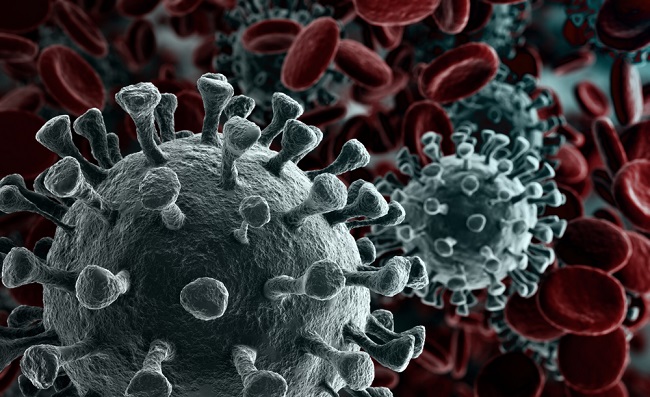Scottish study on COVID-19 patients could change future heart and lung treatment
Published: 24 May 2022
A ground-breaking study led by experts from NHS Golden Jubilee and the University of Glasgow into the effects of COVID-19 on Scottish patients in Intensive Care Units has confirmed evidence that the virus is associated with impaired function of the right side of the heart
A ground-breaking study led by experts from NHS Golden Jubilee and the University of Glasgow into the effects of COVID-19 on Scottish patients in Intensive Care Units (ICUs) has confirmed evidence that the virus is associated with impaired function of the right side of the heart.
Specialists at NHS Golden Jubilee’s University National Hospital say that these findings could play a vital role in not only saving the lives of COVID-19 patients, but for the care of potentially fatal heart and lung issues generally, as well as helping prepare for any possible future pandemic.

The first of its kind, the COVID-RV study aimed to help improve future care and outcomes for those most at risk from COVID-19, by gaining a better understanding of the impact the virus has on the sickest patients who require invasive ventilation.
The study was a massive collaboration across NHSScotland, and was carried out in 10 ICUs across the country, examining 121 critically ill patients who were receiving treatment on ventilators due to the impact of Coronavirus on their system.
The findings revealed that approximately 1 in 3 of the patients in the study showed evidence of abnormalities in the right side of the heart - the area that pumps blood to the lungs.
Lead Author of the study Dr Philip McCall, Honorary clinical senior lecturer at the University of Glasgow and Consultant in Cardiothoracic Anaesthesia and Intensive Care at NHS Golden Jubilee, said: “A combination of factors create the perfect storm for COVID-19 to damage the right side of your heart, which ultimately can cause death.
“If you’re pumping blood to the lungs and the lungs become very sick, you have an additional problem because the lungs are not willing to receive blood.
“This is a very difficult condition to spot, unless you are specifically looking for it. That is why the results of this study are so important. We now know that COVID-19 is a problem associated with not just ventilation, but can affect the heart.”
Chief Investigator of the study Dr Ben Shelley, Consultant in Anaesthesia and Intensive Care at NHS Golden Jubilee, said: “The study has revealed that there is no doubt COVID-19 affects the heart and has a major impact on outcomes for the patient.
“However, now that we know this actually happens, and have a better understanding of how it affects people, we can plan for the future and put in place new care plans and treatments to help combat this.
“For example, ultrasound scans can be used differently to focus in on early warning signs and areas we now know to be at risk.
“If we are able to see these warning signs early enough, clinicians can explore the causes of any complications and start new treatments as soon as possible, potentially improving outcomes for the sickest patients with COVID-19.
“This kind of knowledge is invaluable, not only in combatting any future waves of COVID-19, but in planning for future pandemics to allow people to be treated more effectively. These findings also have several fascinating areas which could be expanded on to help care for other lung conditions in general.”
Nearly half of ventilated patients in the study (47%) died because of COVID-19, a figure that is comparable to national and international death rates. Experts leading the COVID-RV study from NHS Golden Jubilee said that the overall condition of a person’s heart can have a significant impact on how seriously you will be affected by the potentially deadly virus.
The Golden Jubilee University National Hospital, based in Clydebank, has a proven track record in carrying out major studies into heart and lung conditions.
As a world leader in heart and lung specialties and home to Scotland’s regional and national heart and lung services, the expertise in managing critically unwell patients with cardiac and respiratory conditions, along with input from specialist imaging cardiologists, meant that NHS Golden Jubilee was ideally suited to deliver this study.
The COVID-RV study was carried out in a significantly accelerated timeframe. Traditionally, such studies would take at least 1 year just to plan, however, due to the pandemic and the importance of these findings, the research was successfully completed in 6 months and 3 weeks (September 2020 to March 2021, during the height of the pandemic).
Dr McCall and Dr Shelley praised the Scottish critical care community for going “above and beyond” to carry out the study during extreme conditions.
Dr McCall added: “The whole research and critical care community worked quickly together to deliver this important study in response to the pandemic.
“This was the most difficult population to study during the pandemic as, due to patients’ severe conditions, families had to consent to them taking part in the study and conditions within the ICUs were extremely challenging dealing with very sick COVID-19 patients.
“The effort people went to take this challenge on in, what was already a very difficult situation, was simply amazing. They took it on because they believed in it, because it was important, and to get the support we did was just above and beyond by everyone involved.”
The study was funded by Medical Research Scotland through Dr McCall’s and Dr Shelley’s roles in the Anaesthesia, Critical Care and Peri-Operative Medicine Research Group at University of Glasgow and sponsored and administrated by staff in the Golden Jubilee Research Institute.
Enquiries: ali.howard@glasgow.ac.uk or elizabeth.mcmeekin@glasgow.ac.uk / 0141 330 6557 or 0141 330 4831
First published: 24 May 2022
<< May

